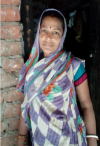ODISHA, INDIA – Susmita Behera is a 40-year-old fisherwoman from the village Krushnanagar, PO Chandaneshwar, PS Bhograi, District Balasore, Odisha, India. Her primary occupation is vending wet fish. Her husband Nilkantha Behera is a fish worker who works in a boat on a daily wage basis. They have three children, and one of them is spastic.

Their family lives in a cycle of poverty. The recent decline in the fish catch is also an added constraint. Moreover, Susmita did not have sufficient capital to buy fish; neither for value addition nor for retail business. She was totally dependent on money lenders or prominent fishermen, from whom she used to avail of loans with steep interest rates. She used to carry wet fish on her head for vending–which is a daunting task; besides looking after her family. There was a time when it seemed almost impossible for the family to continue educating their children.
Then her husband came across ECFWU through a friend. East Coast Fish Workers Union (ECFWU) is an organization of fish farmers primarily working in the coastal district of Balasore in Odisha. It is a trade union and thousands of fish workers both men and women are members of this organization. ECFWU is one of the Farmer Organizations that are part of MTCP2 India.
Initially, Susmita’s husband attended a few meetings, and then he brought her along. She was keenly interested in the activities of ECFWU, and within no time, she started taking an active part in the project work supported by SEWA.
With the help of ECFWU, Susmita gained practical exposure in West Bengal and came to know about the schemes and plans for which her segment is eligible. The list of schemes to which the family of poor fisherwomen, belonging to BPL and OBC, are entitled too is quite long.
Her first big achievement was to procure for the fishermen/women an identity card – she could do this with the help of ECFWU. Thereafter, she availed of small advances from the trade union’s core fund and bid farewell to money lenders. This freed her from perpetual debt. Within six months, she returned the advances and now she has her own small capital for fish vending.
ECFWU has facilitated her application process for an icebox (to MPEDA) with a 50% refundable subsidy. Once she receives this, her fish sales will escalate as the wet fish would be fresh and in good shape for a longer time. She has also applied for a cycle van to gear up her vending business.
Susmita intends to diversify into the value addition of her product and wants to learn dry fish making and pickle making. In line with her goals, she has enrolled herself in training courses being facilitated by ECFWU and will soon learn these skills.
Susmita is an inspiration for many other women fish vendors who are still stuck in the poverty cycle due to poor knowledge, lack of support, and access to information regarding accessing existing entitlements. She is now an active member of ECFWU and a leader of her village. She inspires women to form groups, creates awareness regarding their rights, and explains to them how to claim their rights.
Additionally, her contribution to the family income has increased substantially. Today, her children attend school regularly. Susmita is motivating her husband to take lead in initiating a fisherfolk cooperative, a program started by ECFWU.
Taking one step at a time and being open to learning about schemes and subsidies has made Susmita self-sustaining. #

Comments are closed